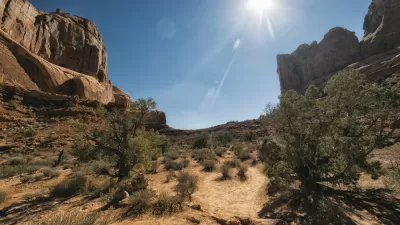Two environmental regulations enacted by the Obama Administration are expected to be rescinded under the Congressional Review Act: the Stream Protection Rule that protects water from mountaintop coal mining and limits on flaring methane emissions.
"Both are recent rules not passed by Congress, but by the executive branch under the Obama administration," states Nathan Rott for National Public Radio (transcript and audio available). "Which is important, that's why they're vulnerable now."
"The Stream Protection Rule covers waterways near surface coal mining operations like mountaintop removal mines," writes Paul Rauber for Sierra.
When the tops of mountains are blown up to get at the coal below, the resultant rubble is dumped into valleys, often leading to pollution of rivers and streams with dangerous heavy metals like selenium, mercury, and arsenic.
Some form of the rule has been around since 1983, but in late December 2016, President Obama finalized a strengthened version of the rule. It says that coal mines must not damage the “hydrologic balance” outside their permit area, and established a 100-foot buffer around streams to preserve native species. The rule also called for restoration of streams that had been damaged.
Congress will be using the Congressional Review Act to overturn this rule. Under this act, "Congress can overturn regulations issued within the last 60 legislative days with simple majority votes in both chambers," according to Countable.us. "'t would need to be signed into law by the president to take effect."
"The other [environmental regulation] limits methane flaring on public land," adds Rott.
That's when companies just burn off methane during oil and gas extraction instead of trying to capture and contain it. Industry says this is an expensive burden that hurts companies. Environmental groups say methane is one of the most powerful greenhouse gases so it needs to be curbed.
Rott goes on to elaborate on the use of the Congressional Review Act (CRA), "a rarely, rarely used legislative tool." According to Brad Plumer of Vox, the House is expected to pass legislation to rescind the Stream Protection Act using the CRA on Feb 1, along with the methane waste regulation, the Securities and Exchange Commission's resource extraction rule, and two other rules, "and will then hand things off to the Senate. Trump is expected to approve all these moves."
The five rules targeted this week may just be the beginning. Republicans could conceivably use the CRA to strike down a flurry of other final-year Obama regulations in the weeks ahead (these fuel-economy standards for trucks might be one target). Democrats don’t have the votes to stop them, and CRA votes are immune from a Senate filibuster. The only real hurdle here is how much time the GOP actually wants to spend mucking around with CRA votes, as opposed to moving on to other business, like health care or taxes.
FULL STORY: GOP Lawmakers Take Steps To Repeal Environmental Regulations

Alabama: Trump Terminates Settlements for Black Communities Harmed By Raw Sewage
Trump deemed the landmark civil rights agreement “illegal DEI and environmental justice policy.”

Planetizen Federal Action Tracker
A weekly monitor of how Trump’s orders and actions are impacting planners and planning in America.

The 120 Year Old Tiny Home Villages That Sheltered San Francisco’s Earthquake Refugees
More than a century ago, San Francisco mobilized to house thousands of residents displaced by the 1906 earthquake. Could their strategy offer a model for the present?

Ken Jennings Launches Transit Web Series
The Jeopardy champ wants you to ride public transit.

BLM To Rescind Public Lands Rule
The change will downgrade conservation, once again putting federal land at risk for mining and other extractive uses.

Indy Neighborhood Group Builds Temporary Multi-Use Path
Community members, aided in part by funding from the city, repurposed a vehicle lane to create a protected bike and pedestrian path for the summer season.
Urban Design for Planners 1: Software Tools
This six-course series explores essential urban design concepts using open source software and equips planners with the tools they need to participate fully in the urban design process.
Planning for Universal Design
Learn the tools for implementing Universal Design in planning regulations.
Clanton & Associates, Inc.
Jessamine County Fiscal Court
Institute for Housing and Urban Development Studies (IHS)
City of Grandview
Harvard GSD Executive Education
Toledo-Lucas County Plan Commissions
Salt Lake City
NYU Wagner Graduate School of Public Service





























